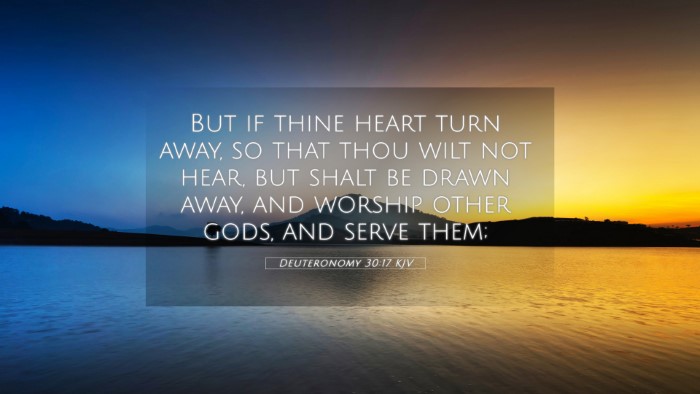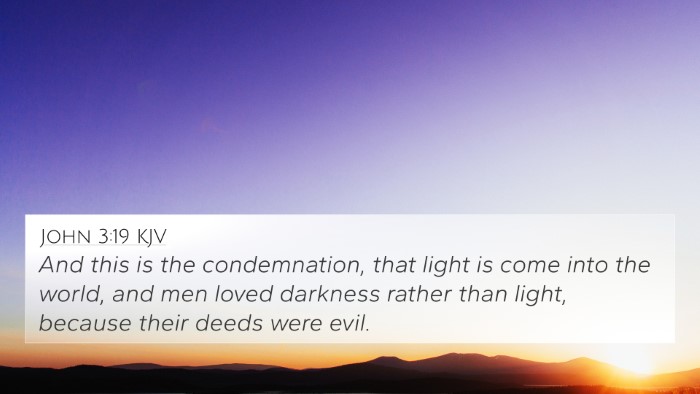Deuteronomy 30:17 - Verse Summary
Deuteronomy 30:17 warns of the consequences of turning away from God's commandments and following one's own desires. This verse emphasizes the importance of free will and the choices that individuals must make regarding their faith and obedience to God.
Commentary Insights
-
Matthew Henry:
Henry suggests that the verse illustrates the stark choice faced by the people of Israel: to follow God's way or their own selfish inclinations. He notes that turning away from God's commandments leads to spiritual death and futility. This critical decision reveals the human tendency toward rebellion and the dire consequences of such rebellion.
-
Albert Barnes:
Barnes underscores the significance of personal agency in the relationship between humans and God. He remarks that the phrase “if thine heart turn away” indicates a warning against allowing the heart to stray from God's statutes. Barnes explains that this implies a deliberate action to turn one's heart, which results in a separation from divine favor and blessings.
-
Adam Clarke:
Clarke emphasizes the conditional nature of God's blessings in relation to human choices. He discusses the idea that deviation from the path laid out by God leads to ruin and heartbreak. Clarke affirms that the people are empowered to choose, yet they must consider the weight of their decisions on their covenant with God.
Biblical Cross-References
- Proverbs 1:28-31: A warning about the consequences of ignoring wisdom, echoing the theme of choices.
- Jeremiah 17:9: The deceitfulness of the heart emphasizes the importance of directing it towards God.
- Joshua 24:15: A call to choose whom to serve, reinforcing the significance of decision-making in faith.
- Romans 8:5-6: A comparison of living according to the flesh versus the Spirit, relating to the choice between desires and obedience.
- Galatians 6:7-8: Reaping what one sows aligns with the message of consequences presented in Deuteronomy 30:17.
- 1 John 2:15-17: A warning against love for the world, paralleling internal struggles reflected in the verse.
- Hebrews 3:12: An admonition against heart straying from God, linking to the dangers highlighted in Deuteronomy 30:17.
Understanding the Impact of Choices
The implications of Deuteronomy 30:17 tap into deeper theological themes about human nature, free will, and the divine-human relationship. It resonates throughout scripture, where the choice between life in covenant with God and apart from Him recurs across both the Old and New Testaments.
Contextual Analysis
In the broader context of Deuteronomy, Moses speaks to the Israelites before entering the Promised Land, urging them to remain faithful. This verse serves as a crucial pivot in his discourse, highlighting not only warnings but also the rich promises of life attached to obedience. The heartfelt nature of this plea bears reminder of God's desire for an authentic and devoted relationship with His people.
Thematic Connections
This verse can be connected thematically to various biblical narratives and teachings:
- The concept of repentance: The necessity of returning to God after straying is a prominent theme throughout the Bible.
- The tension between faith and works: Emphasized in New Testament letters, particularly in the discussions by Paul, illustrating that faith indeed must be accompanied by obedience to live out that faith.
Cross-Referencing Resources
Understanding and interpreting Deuteronomy 30:17 can be enhanced through various Bible reference resources. Tools such as concordances, thematic study guides, and cross-reference Bibles are particularly beneficial for examining connections between Bible verses. These resources help uncover a deeper understanding of the scripture through comparative Bible verse analysis and thematic Bible verse connections.
Conclusion
Deuteronomy 30:17 serves as a vital reminder of the choices that shape our spiritual journeys. The collective insights of public domain commentaries reveal a layered understanding of the text, offering valuable lessons on the importance of our will, the dire consequences of turning away from God, and the promise of life through obedience.












